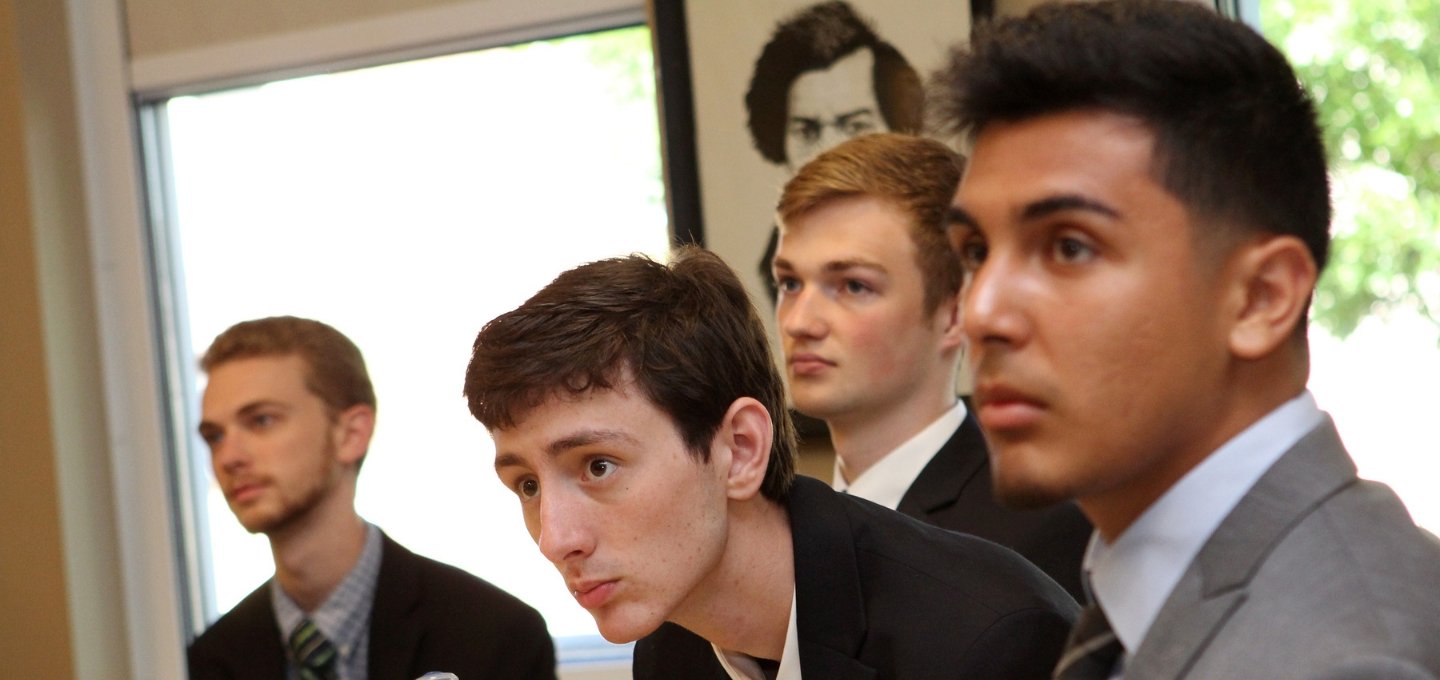Producing top talent for tech is second-nature to Wabash College
When it comes to producing the employees who will fill the needed roles in tech and tech-enabled companies, Wabash College is leading the way. The college asks its students to take a different, broader approach toward education, and those students have found great success in doing so.
In each of the last two years, Wabash has produced four Orr Fellows from its graduating classes, bringing the total to 18 in the past 10 years. Based in Crawfordsville, Ind., the college currently has enrolled about 875 students in total—making the selection of four fellows even more impressive. The heart of the Orr Fellowship is to connect high-achieving students with fast-moving Indianapolis companies, which are oftentimes tech or tech-enabled companies.
The four Wabash men entering the program reflect that connection, as they join Indy tech companies like Onebridge, KSM Consulting and Canvas. The students credit much of their success to date to Wabash’s liberal arts approach. They stand as a testament to what can be accomplished through the college’s liberal arts strategies, with students eager to gain skills useful throughout the tech community and with professors delivering innovative teaching strategies through readily available programs and leadership opportunities.
Liberal arts pillars give strong foundation to Wabash College students
A strong liberal arts education provides the backbone for Wabash College graduates. Rather than focus specifically on developing a technical background for students, liberal arts uses a broad base of experiences strengthen students’ problem-solving and critical-thinking skills. At graduation, Wabash students are equipped with foundational skills and knowledge that allow them to enter into any segment of the workforce, including tech, and be successful.
The liberal arts model sits upon several core pillars: academic rigor, critical thought, problem solving, and clear and thoughtful communication. One such program that allows for real-life learning outside the classroom is the Center for Innovation, Business and Entrepreneurship (CIBE). The program doesn’t require students to pursue a business degree as the center’s name may suggest; rather, the CIBE provides entrepreneurial knowledge and interdisciplinary practice that Wabash men can incorporate into their chosen field of study. The CIBE follows an educational strategy embracing the “Four I’s”: instruction, intensives, internships and involvement. Together, these directives build an instructive foundation that Wabash men then put to work through real-world experiences.
“We are preparing students by offering intensive hard-skill training outside of the classroom. We are offering certifications in Lean Process Improvement, Project Management, Design Thinking, Sandler Sales, and Emotional Intelligence. We continue to add new experience, next year we will do training in Design Thinking,” commented Roland Morin, Director of the CIBE. “Our students are also completing at least two internships and working as Innovation Consultants where they are paired with organizations to work on solving real-world problems for the company.”
Such experiential learning places CIBE students in front of company and community issues that they explore through intensive studies, internships and consulting work. Using the CIBE’s resources, Wabash men have accomplished some impressive results through these intensives, including two students uncovering $6.4 million in potential tax fraud in Crawfordsville using software they developed, which they’ve now spun off into their own company.
“Wabash students are challenged to put their intensive training to work by having them engage with companies to solve real-world problems in operations, finance, marketing, sales, and logistics. They are working side-by-side with leaders at firms as an extension of the workforce. These experiences are providing students with concrete examples of how they have helped a company,” Morin commented.
Another beneficiary of the liberal arts program is Wabash Democracy and Public Discourse (WDPD) initiative, in which students can better hone leadership practices and gain a deeper understanding of their roles in civic life. Students then use the concepts they learn to lead dialogues and community forums within and outside of the Wabash community, on topics like healthcare, politics, the environment and more.
“Students take part in Wabash Democracy and Public Discourse because they want to make a real-world impact and improve communities across the Midwest,” said Sara Drury, Director of WDPD and Associate Professor of Rhetoric. “WDPD students are creating civic innovations for local communities, and learning analytical thinking, project management, teamwork, and effective communication. These are foundational skills for 21st century workplaces.”
Wabash men accomplish results in the Indiana tech ecosystem
Thanks to those Wabash experiences, graduates have gone on to lead endeavors in many industries. The benefits of a liberal arts education become apparent when graduates are asked to take on new company initiatives, develop innovative strategies or build creative solutions to community challenges.
The Indiana tech ecosystem has especially benefited from Wabash graduates who’ve settled into and helped shape and lead the community. From Sales Bootcamp graduates to founders of fast-growing companies and TechPoint executive committee board members, Wabash men are contributing their knowledge and expertise to companies and organizations throughout the state.
“The CIBE Programs are being recognized by the technology industry across Indiana: more than half of CIBE underclassmen are interning at tech or tech-enabled companies because of the experiences students have through the CIBE. The tech industry is starting to see the importance of hiring students with strong liberal arts critical thinking and problem solving skills that have been paired with recognizable certifications and real-world work experience. We have CIBE students at firms from Appirio to Salesforce, from Springbuk and Lessonly to Trek10,” Morin commented.
With four new Orr Fellows entering the workforce in tech and tech-enabled companies, Wabash College continues to position itself as a leader in developing an intelligent and capable workforce—a position the college expects to develop even further in the future.
“We have over 15% of our students engaged in the WDPD and CIBE, and we are listening to the tech community and preparing to add new intensives that are being used in the technology sector, such as Agile, Scrum, Tableau, and AWS,” said Morin. “When you add any of these experiences to a Wabash degree, we think you have a recipe for success.”




